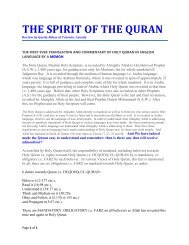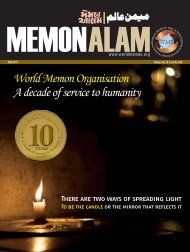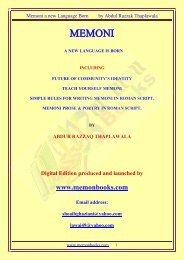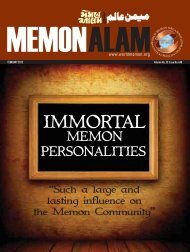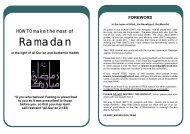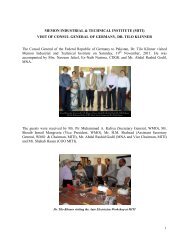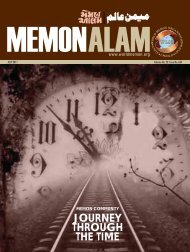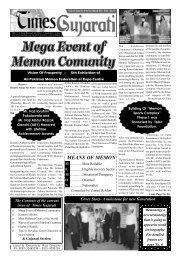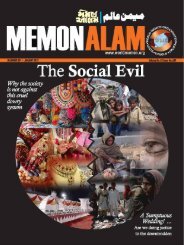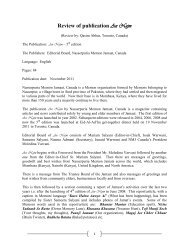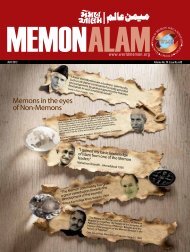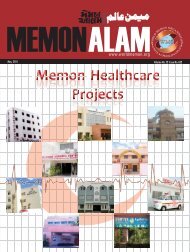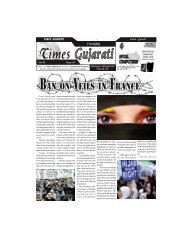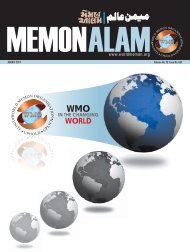Illigal Occupation of Junagafh - Memon Books
Illigal Occupation of Junagafh - Memon Books
Illigal Occupation of Junagafh - Memon Books
You also want an ePaper? Increase the reach of your titles
YUMPU automatically turns print PDFs into web optimized ePapers that Google loves.
Illegal <strong>Occupation</strong> <strong>of</strong> Junagadh<br />
By Abdul Razzak Thaplawala<br />
Illegal <strong>Occupation</strong> <strong>of</strong> Junagadh<br />
A Pakistani Territory<br />
Digital Edition<br />
By Abdur Razzaq Thaplawala<br />
Digital Edition produced and launched by<br />
www.memonbooks.com<br />
Email address:<br />
shoaibghaziani@yahoo.com<br />
lawai49@yahoo.com<br />
www.memonbooks.com 2
Illegal <strong>Occupation</strong> <strong>of</strong> Junagadh<br />
By Abdul Razzak Thaplawala<br />
All rights reserves to the Author<br />
Name <strong>of</strong> Book:<br />
Auther:<br />
Illegal <strong>Occupation</strong> <strong>of</strong> Junagadh - A Pakistani Territory<br />
Abdul Razzak Thaplawala<br />
Digital Edition April 2011<br />
Digitalized by<br />
Qasim Moosa Lawai (www.memonbooks.com)<br />
Technical Advisor: Shoaib Ghaziani (www.memonbooks.com)<br />
Print Edition: 2008<br />
No. <strong>of</strong> Copies: 1000<br />
ISBN No: ISBN # 978-969-8935-02-3<br />
Price:<br />
Website:<br />
Free<br />
www.memonbooks.com<br />
Any part or whole <strong>of</strong> the contents <strong>of</strong> this book can be freely<br />
printed without permission <strong>of</strong> the author but without any alteration.<br />
The source may please be acknowledged. It will be appreciated if a<br />
copy <strong>of</strong> the publication in which any part <strong>of</strong> this booklet are<br />
reproduced is sent to the author.<br />
Compiled and Published by<br />
Abdur Razzaq Thaplawala<br />
C-15, Dawood Cooperative Housing Society, Karachi-74800<br />
Phone: Off: 4534235 Fax: 4534302 Res: 4930229 Mobile: 0300-8223787<br />
e-mail: arthaplawala@lucky-cement.com<br />
www.memonbooks.com 4
Illegal <strong>Occupation</strong> <strong>of</strong> Junagadh<br />
By Abdul Razzak Thaplawala<br />
All rights reserves to the Author<br />
Publications by the same auther Mr. Abdur Razzaq Thaplawala<br />
Illegal <strong>Occupation</strong> <strong>of</strong> Junagadh - A Pakistani Territory ISBN # 978-969-8935-02-3<br />
Bantva Kul Aur Aaj ISBN # 978-969-8935-01-6<br />
<strong>Memon</strong>i – A New Language is Born ISBN # 969-8606-01-7<br />
<strong>Memon</strong> Community & Future <strong>of</strong> its identity ISBN # 969-8606-00-9<br />
<strong>Memon</strong> Community – A Brief Historical Perspective ISBN # 969-8634-00-9<br />
The <strong>Memon</strong> Community – ISBN # 969-8935-00-2<br />
Its’ origin, history, culture, tradition & language<br />
Any part or whole <strong>of</strong> the contents <strong>of</strong> this book can be freely<br />
printed without permission <strong>of</strong> the author but without any alteration.<br />
The source may please be acknowledged. It will be appreciated if a<br />
copy <strong>of</strong> the publication in which any part <strong>of</strong> this booklet are<br />
reproduced is sent to the author.<br />
Compiled and Published by<br />
Abdur Razzaq Thaplawala<br />
C-15, Dawood Cooperative Housing Society, Karachi-74800<br />
Phone: Off: 4534235 Fax: 4534302 Res: 4930229 Mobile: 0300-8223787<br />
e-mail: arthaplawala@lucky-cement.com<br />
www.memonbooks.com 5
Illegal <strong>Occupation</strong> <strong>of</strong> Junagadh<br />
By Abdul Razzak Thaplawala<br />
ILLEGAL OCCUPATION OF JUNAGADH<br />
A PAKISTANI TERRITORY<br />
BY ABDUR RAZZAQ THAPLAWALA<br />
Table <strong>of</strong> Contents<br />
ILLEGAL OCCUPATION OF JUNAGADH ................................................................................. 7<br />
INSTRUMENT OF ACCESSION .................................................................................................... 9<br />
CONSTITUTION OF PAKISTAN ................................................................................................ 10<br />
POSTAGE STAMPS SHOWING JUNAGADH AS PART OF PAKISTAN ............................. 11<br />
COINS OF JUNAGADH ................................................................................................................. 13<br />
V.P. MENON’S THREATS TO JUNAGADH ADMINISTRATION ......................................... 14<br />
AARZEE HUKUMAT ..................................................................................................................... 15<br />
ENTRY OF INDIAN FORCES IN JUNAGADH ......................................................................... 17<br />
EXCHANGE OF COMMUNICATION BETWEEN PRIME MINISTERS OF TWO<br />
DOMINIONS .................................................................................................................................... 18<br />
FARCE OF REFERENDUM .......................................................................................................... 20<br />
OCCUPATION OF MANAVADAR .............................................................................................. 20<br />
OCCUPATION OF BANTVA & KUTIYANA ............................................................................. 21<br />
CONTRIBUTION OF MIGRANTS TO THE ECONOMY OF PAKISTAN ............................ 23<br />
ANNEXURE-A: ............................................................................................................................... 27<br />
DASTRURAL AMAL SARKAR JUNAGADH ............................................................................ 27<br />
ANNEXURE-B ................................................................................................................................. 28<br />
INSTRUMENT OF ACCESSION DATED 15TH SEPTEMBER, 1947 BETWEEN<br />
JUNAGADH & PAKISTAN ........................................................................................................... 28<br />
LAST DAYS OF JUNAGADH ....................................................................................................... 31<br />
ABOUT THE AUTHOR ................................................................................................................. 34<br />
JUNAGADH, PAST & PRESENT IN PICTURES ...................................................................... 35<br />
www.memonbooks.com 6
Illegal <strong>Occupation</strong> <strong>of</strong> Junagadh<br />
By Abdul Razzak Thaplawala<br />
ILLEGAL OCCUPATION OF JUNAGADH<br />
The Government & Political parties in Pakistan are continuously<br />
fighting for affiliation <strong>of</strong> disputed territory <strong>of</strong> Jamu and Kashmir with<br />
Pakistan. However, nobody is speaking a single word about the territory<br />
which was formally affiliated with Pakistan as early as in 1947 i.e. the<br />
State <strong>of</strong> Junagarh in Gujrat Province <strong>of</strong> India.<br />
Apart from Kashmir, people also <strong>of</strong>ten raise the case <strong>of</strong> occupation<br />
<strong>of</strong> Hyderabad (Dakkan) by India. This is so because our politicians and<br />
people are not aware <strong>of</strong> the legal and constitutional status <strong>of</strong> the three<br />
disputed territories.<br />
After announcement <strong>of</strong> scheme <strong>of</strong> partition by Lord Mountbatten<br />
on 3 rd June, 1947, The British Parliament passed Indian Independence<br />
Act, 1947 on 11 th July, 1947. According to the Indian Independence Act,<br />
1947, the native states were given the following choices to remain<br />
independent:<br />
ACCEDE TO EITHER OF THE TWO DOMINIONS, INDIA OR<br />
PAKISTAN.<br />
In late 1946, the Kashmiris started struggle against Dogra<br />
Maharaja <strong>of</strong> Kashmir. The Maharaja therefore took refuge in Delhi and<br />
begged for Indian help. Taking advantage <strong>of</strong> his presence in Delhi Sardar<br />
Valabh Bhai Patel obtained his signature on the Instrument <strong>of</strong> Accession.<br />
Thus constitutionally the Kashmir became part <strong>of</strong> India and Indian Army<br />
entered into Kashmir.<br />
The State <strong>of</strong> Hyderabad Dakhan exercised its choice to remain<br />
independent and accordingly made an announcement. The Indian<br />
Government however forcibly occupied the Hyderabad State.<br />
The case <strong>of</strong> Junagadh was completely different from the cases <strong>of</strong><br />
Jammu and Kashmir and Hyderabad Dakhan. The Indian Government<br />
made its utmost efforts to compel Nawab <strong>of</strong> Junagadh to accede to India<br />
www.memonbooks.com 7
Illegal <strong>Occupation</strong> <strong>of</strong> Junagadh<br />
By Abdul Razzak Thaplawala<br />
but Nawab Saheb <strong>of</strong> Junagadh remained firm. The Indian Minister Mr.<br />
V.P. Menon came to Nawab Saheb to request, for accession to India and<br />
in case <strong>of</strong> denial, he did not hesitate to issue a threat <strong>of</strong> dire<br />
consequences as well.<br />
The Junagadh State had however decided to join Pakistan and<br />
announcement to this effect was made in the gazette <strong>of</strong> Junagadh which<br />
was known as “DASTRURAL AMAL SARKAR JUNAGADH” on 15 th August,<br />
1947.<br />
The full text <strong>of</strong> the extra ordinary part <strong>of</strong> the ‘Dastural Amal Sarkar<br />
Junagadh’ is annexed as “ANNEXURE ‘A’” to this booklet.<br />
www.memonbooks.com 8
Illegal <strong>Occupation</strong> <strong>of</strong> Junagadh<br />
By Abdul Razzak Thaplawala<br />
INSTRUMENT OF ACCESSION<br />
Immediately after making the announcement, the Jungadh<br />
Government communicated accession with Pakistan and a delegation<br />
with the Instrument <strong>of</strong> Accession signed by Nawab <strong>of</strong> Junagadh was sent<br />
to Karachi headed by Mr. Ismail. The constitution assembly <strong>of</strong> Pakistan<br />
considered the proposal in detail and approved it. The Quaid-e-Azam<br />
Muhammad Ali Jinnah who was the Governor General <strong>of</strong> Pakistan signed<br />
the ‘Instrument <strong>of</strong> Accession’ on 15 th September, 1947. The Instrument<br />
<strong>of</strong> Accession dated 15 th September, 1947 is reproduced as “ANNEXURE-<br />
B” to this booklet.<br />
The Instrument <strong>of</strong> Accession provided for the right <strong>of</strong> Pakistan<br />
legislature to legislate in the following areas:<br />
a) Defence<br />
b) Communication<br />
c) Others<br />
It may be noted, that although territory <strong>of</strong> Junagadh was<br />
geographically not adjoining the Pakistan territory, it had a direct link<br />
through sea by Verawal Port <strong>of</strong> Junagadh.<br />
www.memonbooks.com 9
Illegal <strong>Occupation</strong> <strong>of</strong> Junagadh<br />
By Abdul Razzak Thaplawala<br />
CONSTITUTION OF PAKISTAN<br />
The article <strong>of</strong> constitution <strong>of</strong> Pakistan 1956 provides as follows:<br />
“The Republic and its Territories: Pakistan is a Federation<br />
comprising <strong>of</strong><br />
a) Territories <strong>of</strong> East and West Pakistan.<br />
b) The “Territories <strong>of</strong> States which are in Accession with” or may<br />
Accede to Pakistan.”<br />
Apart from Junagadh which was later occupied by India, the<br />
states which had acceded to Pakistan included Khairpur, Swat, Dir and<br />
Chitral but none <strong>of</strong> them including Junagadh were mentioned in the<br />
constitution by name. Since states <strong>of</strong> Khairpur, Swat, Dir and Chitral<br />
formed the part <strong>of</strong> geographical area <strong>of</strong> Pakistan, they were merged with<br />
West Pakistan.<br />
www.memonbooks.com 10
Illegal <strong>Occupation</strong> <strong>of</strong> Junagadh<br />
By Abdul Razzak Thaplawala<br />
POSTAGE STAMPS SHOWING JUNAGADH AS PART<br />
OF PAKISTAN<br />
The Pakistan Government also recognized Junagadh and<br />
Manavadar as part <strong>of</strong> Pakistan by including it in its postage stamp<br />
reproduced on the title <strong>of</strong> this booklet:<br />
“These stamps were issued by Government <strong>of</strong> Pakistan to show<br />
Junagadh and Manavadar as part <strong>of</strong> Pakistan. These stamps were also<br />
used for use <strong>of</strong> Government Offices with over printing <strong>of</strong> ‘SERVICE’ on<br />
them. In 1963, an International Stamp Exhibition which was held at<br />
Dacca, the 2 anna or 13 paisa stamp was used as special stamp on the<br />
occasion <strong>of</strong> the stamp exhibition.”<br />
The agreement for accession with Pakistan was signed by the<br />
State <strong>of</strong> Junagadh accepting Quaid-e-Azam Muhammad Ali Jinnah, as<br />
Governor General <strong>of</strong> Pakistan. However, the Indian government forcibly<br />
occupied the state on 9 th November, 1947. One should expect that if not<br />
<strong>of</strong>ten atleast on 9 th November every year, the Government and Politic<br />
parties should register protest against illegal occupation <strong>of</strong> Pakistan<br />
territory by India. The Government should also include it as an issue<br />
while negotiating Kashmir issue with India.<br />
www.memonbooks.com 11
Illegal <strong>Occupation</strong> <strong>of</strong> Junagadh<br />
By Abdul Razzak Thaplawala<br />
V.P. MENON’s THREATS TO JUNAGADH<br />
ADMINISTRATION<br />
The Junagadh government announced its consent to accede to<br />
Pakistan as early as on 12th August, 1947. This decision was published<br />
in Dasturul Amal <strong>of</strong> Junagadh State on 15th August, 1947. The<br />
instrument <strong>of</strong> accession was however, formally signed by Quaid-e-Azam<br />
on 15th September, 1947 and accordingly it was notified in Gazette <strong>of</strong><br />
Pakistan and Dasturul Amal (Gazette <strong>of</strong> Junagadh State) on that date.<br />
Mr. V.P. Menon, the secretary <strong>of</strong> States department <strong>of</strong> Government <strong>of</strong><br />
India rushed to Junagadh on 17th September 1947, and met Sir Shah<br />
Nawaz Bhutto, the Dewan or Chief Minister <strong>of</strong> Junagadh. Menon insisted<br />
that he had brought a message <strong>of</strong> Indian Government, and will like to<br />
deliver it to Nawab Saheb only. Sir Shah Nawaz Bhutto showed his<br />
inability to arrange a meeting with Nawab Saheb, as he was not feeling<br />
well. Menon expressed his displeasure over this refusal, but finally<br />
conveyed the message <strong>of</strong> Indian Government to Shahnawaz Bhutto<br />
insisting that Junagadh should withdraw its accession to Pakistan.<br />
Bhutto told Menon, that the accession was now complete, and<br />
according to the international law, only the Government <strong>of</strong> Pakistan can<br />
talk on the subject. Menon left after the threats <strong>of</strong> dire consequences.<br />
Menon immediately went to Mumbai, and called a meeting <strong>of</strong><br />
Saamar Das Gandhi a journalist <strong>of</strong> Rajkot and his accomplices, who were<br />
already present in Mumbai according to a pre-arranged scheme. He<br />
unfolded the scheme <strong>of</strong> "Arziee Hukumat" (Provisional Government)<br />
before them.<br />
On 24th September 1947, Mahatma Gandhi condemned the action<br />
<strong>of</strong> Junagadh Government in strong words in a prayer meeting held at<br />
Delhi. This was a green signal for starting the process <strong>of</strong> the occupation<br />
<strong>of</strong> Junagadh.<br />
www.memonbooks.com 14
Illegal <strong>Occupation</strong> <strong>of</strong> Junagadh<br />
By Abdul Razzak Thaplawala<br />
AARZEE HUKUMAT<br />
On 25th September 1947, a meeting was held in Madhav Garden<br />
<strong>of</strong> Mumbai, where formal announcement <strong>of</strong> the formation <strong>of</strong> "Arzee<br />
Hukumat" or Provisional Government <strong>of</strong> Junagarh was made. Shamad<br />
Das Gandhi was nominated as the President <strong>of</strong> the Provisional<br />
Government. Shamad Das Gandhi and some <strong>of</strong> his colleagues who were<br />
declared as ministers with various portfolios took oath <strong>of</strong> their respective<br />
<strong>of</strong>fices. Shamad Das Gandhi was a nephew <strong>of</strong> Mahatma Gandhi and was<br />
not a resident <strong>of</strong> Junagadh State.<br />
Immediately after announcement <strong>of</strong> the Provisional Government,<br />
the ministers <strong>of</strong> the provisional government proceeded to Rajkot and<br />
occupied Junagadh House on 27th September 1947. The Indian<br />
Government acted as a silent spectator.<br />
In the meanwhile, there was some exchange <strong>of</strong> letters & telegrams<br />
between the government <strong>of</strong> India and Pakistan. Pakistan took a firm<br />
stand and told the Indian Government, that the accession was in<br />
accordance with the Scheme <strong>of</strong> Independence announced by the<br />
outgoing British Government and Junagadh was now part <strong>of</strong> Pakistan.<br />
While, this exchange <strong>of</strong> correspondence was going on, the Indian<br />
Government encircled the Junagadh State and stopped the movement <strong>of</strong><br />
goods, transport and postal articles to and from Junagadh.<br />
As a part <strong>of</strong> the preparation for occupation <strong>of</strong> the Junagadh, a<br />
"Kathiawar Defence Force" was formed by the Government <strong>of</strong> India with<br />
Brigadier Guru Dayal Singh, as Commanding Officer and head quarter in<br />
Rajkot. There were three war ships, which, were anchored at the port <strong>of</strong><br />
Porbandar. A squadron, consisting <strong>of</strong> eight Tempest aircrafts, was<br />
stationed at Rajkot and additional companies <strong>of</strong> Armed Forces were<br />
deployed at Rajkot. The Indian aircrafts started to fly over Junagadh<br />
territory at very low heights to harass the public.<br />
www.memonbooks.com 15
Illegal <strong>Occupation</strong> <strong>of</strong> Junagadh<br />
By Abdul Razzak Thaplawala<br />
The scattered attacks on the villages and small towns <strong>of</strong> the<br />
Junagadh State, by the forces <strong>of</strong> provisional government started causing<br />
heavy damage to life & property <strong>of</strong> Muslim population. In the view <strong>of</strong><br />
worsening situation and threats received from various sources, the<br />
Nawab <strong>of</strong> Junagadh and his family left Junagadh and arrived in Karachi<br />
on 25th October 1947.<br />
On 27th October 1947, Shah Nawaz Bhutto, the Chief Minister <strong>of</strong><br />
Junagadh wrote a letter to Quaid-e-Azam explaining the critical situation,<br />
in which the State Government was placed due to actions <strong>of</strong> Indian<br />
Government. The situation kept worsening; Bhutto sent another letter on<br />
28th October 1947, to Ikramullah, the Secretary <strong>of</strong> Pakistan's Ministry <strong>of</strong><br />
Foreign Affairs and sought help and directions <strong>of</strong> the Government <strong>of</strong><br />
Pakistan. Unfortunately, there was no response from the Government <strong>of</strong><br />
Pakistan. When all hopes for assistance from government <strong>of</strong> Pakistan<br />
were lost, Shah Nawaz Bhutto sent a letter on 1st November 1947, to<br />
Nawab Saheb at Karachi, explaining the situation and the dangers to the<br />
lives and properties <strong>of</strong> entire Muslim population <strong>of</strong> Junagadh, as an<br />
armed attack by the Indian Government and its stooges from the<br />
provisional government was imminent. In a return telegram, the Nawab<br />
Saheb authorised Bhutto to act in the best interest <strong>of</strong> the Muslim<br />
population <strong>of</strong> Junagadh and save their lives.<br />
A meeting <strong>of</strong> Junagadh State Council was called on 5th November<br />
1947, to discuss the critical situation. The Council authorised Mr. Bhutto<br />
to take appropriate action. Sir Shah Nawaz Bhutto sent Captain Harvey<br />
Johnson, a senior member <strong>of</strong> the Council <strong>of</strong> Ministers to Rajkot to meet<br />
high Indian <strong>of</strong>ficials. Instead <strong>of</strong>, meeting the Indian <strong>of</strong>ficials, Johnson<br />
met the <strong>of</strong>ficials <strong>of</strong> Provisional Government and brought back the threats<br />
<strong>of</strong> dire consequences, if the Junagadh did not surrender itself to the<br />
Provisional Government.<br />
Another meeting <strong>of</strong> the Junagadh State Council was again<br />
convened on 7th November 1947. Some prominent citizens <strong>of</strong> the<br />
Junagadh State were also invited at the meeting. The meeting continued<br />
till 3 O'clock late night, and decided that instead <strong>of</strong> surrendering to the<br />
so-called Provisional Government, the Indian Government may be<br />
www.memonbooks.com 16
Illegal <strong>Occupation</strong> <strong>of</strong> Junagadh<br />
By Abdul Razzak Thaplawala<br />
requested to take over the administration <strong>of</strong> Junagadh to protect the<br />
lives <strong>of</strong> its citizens, which were being constantly threatened by unruly<br />
forces <strong>of</strong> Provisional Government.<br />
On 8th November 1947, Shah Nawaz Bhutto sent a letter to Nilam<br />
Butch, the Provincial Head <strong>of</strong> Indian Government in Rajkot, requesting<br />
him to help him in restoring the law & order situation in Junagadh, to<br />
stop the blood shade <strong>of</strong> the innocent citizens.<br />
Harvey Johnson took the message to Rajkot. The head <strong>of</strong> Indian<br />
Administration immediately rang up V.P. Menon in Delhi and read out<br />
the letter <strong>of</strong> Shah Nawaz Bhutto to him. Menon immediately rushed to<br />
the residence <strong>of</strong> Pandit Jawahir Lal Nehru and explained the situation.<br />
After consultation with various ministers and Valabh Bhai Patel, the<br />
home minister in particular, a formal order was immediately drafted, and<br />
a notification was issued, announcing the take over <strong>of</strong> Junagadh at the<br />
request <strong>of</strong> the Chief Minister <strong>of</strong> Junagadh. The notification promised a<br />
referendum in due course.<br />
Shah Nawaz Bhutto left Junagadh for Karachi on the night <strong>of</strong> 8th<br />
November 1947.On 9 th November 1947, the Indian Air Force sent<br />
several sorties to fly at a low height on the Junagadh.<br />
ENTRY OF INDIAN FORCES IN JUNAGADH<br />
Soon thereafter columns <strong>of</strong> Indian tanks, Armour Vehicles and<br />
Jeeps carrying Indian soldiers entered Junagadh State. At 6:00 P.M. on<br />
9th November 1947, Captain Harvey Johnson and Chief<br />
Secretary Gheewala, a civil servant <strong>of</strong> Junagadh State, formally handed<br />
over the charge <strong>of</strong> the State to the Indian Government.<br />
www.memonbooks.com 17
Illegal <strong>Occupation</strong> <strong>of</strong> Junagadh<br />
By Abdul Razzak Thaplawala<br />
EXCHANGE OF COMMUNICATION BETWEEN PRIME<br />
MINISTERS OF TWO DOMINIONS<br />
On the same day, Jawahir LaI Nehru sent a telegram to<br />
Nawabzada Liaquat Ali Khan conveying the information about take-over<br />
<strong>of</strong> Junagadh. Liaquat Ali Khan sent a return telegram to Nehru stating<br />
that the Junagadh was Pakistani territory, and nobody, except Pakistan<br />
Government was authorised to invite anybody to Junagadh. He also<br />
accused Indian Government <strong>of</strong> a naked aggression on Pakistan's territory<br />
and violation <strong>of</strong> International law.<br />
The Government <strong>of</strong> Pakistan seriously and strongly opposed the<br />
Indian aggression. Pandit Jawaharlal Nehru wrote,<br />
Ín view <strong>of</strong> special circumstances pointed out by Junagadh Dewan<br />
that is the Prime Minister <strong>of</strong> Junagadh – our Regional Commissioner at<br />
Rajkot has taken temporarily charge <strong>of</strong> Junagadh administration. This<br />
has been done to avoid disorder and resulting chaos. We have, however,<br />
no desire to continue this arrangement and wish to find a speedy<br />
solution in accordance with the wishes <strong>of</strong> the people <strong>of</strong> Junagadh. We<br />
have pointed out to you previously that final decision should be made by<br />
means <strong>of</strong> referendum or plebiscite. We would be glad to discuss this<br />
question and allied matters affecting Junagadh with representatives <strong>of</strong><br />
your Government at the earliest possible moment convenient to you. We<br />
propose to invite Nawab <strong>of</strong> Junagadh to send his representatives to this<br />
conference.”<br />
In reply to the above telegram, the Prime Minister <strong>of</strong> Pakistan sent<br />
the following telegram:<br />
“Your telegram informing that your Government had taken charge<br />
<strong>of</strong> Junagadh was received by me on November 10, 1947. Your action in<br />
taking over State Administration and sending Indian troops to state<br />
without any authority from Pakistan Government and indeed without our<br />
knowledge, is a clear violation <strong>of</strong> Pakistan territory and breach <strong>of</strong><br />
International law. Indian Government’s activities on accession <strong>of</strong><br />
www.memonbooks.com 18
Illegal <strong>Occupation</strong> <strong>of</strong> Junagadh<br />
By Abdul Razzak Thaplawala<br />
Junagadh to Pakistan have all been directed to force the State to<br />
renounce accession and all kinds <strong>of</strong> weapons have been used by you to<br />
achieve this end. We consider your action in taking charge <strong>of</strong> Junagadh<br />
Administration and sending Indian troops to occupy Junagadh to be a<br />
direct act <strong>of</strong> hostility against Pakistan Dominion. We demand that you<br />
should immediately withdraw your forces, and relinquish charge <strong>of</strong><br />
administration to the rightful ruler and stop people <strong>of</strong> Union <strong>of</strong> India<br />
from invading Junagadh and committing acts <strong>of</strong> violence”.<br />
This was the followed by a Press Statement made by the Prime<br />
Minister <strong>of</strong> Pakistan. It was communicated to Prime Minister <strong>of</strong> India o n<br />
November 16, 1947. it read as follows:<br />
“Inspite <strong>of</strong> the gravest provocation, we have refrained from any<br />
action which should result in armed conflict. We could with full<br />
justification and legal right could have sent our forces to Junagadh but at<br />
no time since the accession <strong>of</strong> state, was a single soldier sent by us to<br />
Junagadh and our advice throughout to the State Authorities was to<br />
exercise the greatest restraint. Manawadar, another State which had<br />
acceded to Pakistan and Mangrol and Babariawad have also been<br />
occupied by Indian troops.”<br />
www.memonbooks.com 19
Illegal <strong>Occupation</strong> <strong>of</strong> Junagadh<br />
By Abdul Razzak Thaplawala<br />
FARCE OF REFERENDUM<br />
On 13th November 1947, Valabh Bhai Patel, an Indian Minister and<br />
the Architect <strong>of</strong> the take-over came to Junagadh. A big procession was<br />
taken out and large meeting was held in the ground <strong>of</strong> Bahauddin<br />
College. In his speech, Patel criticized the Muslim population <strong>of</strong> Junagadh<br />
and particularly the <strong>Memon</strong> community for its help to All India Muslim<br />
League before partition. Later he asked the audience if they wanted to<br />
join India or Pakistan. The audience, which mainly consisted <strong>of</strong> Hindu<br />
population, raised their hands in favour <strong>of</strong> India. This was but natural in<br />
the given situation. Patel termed this response from the audience as<br />
Referendum promised by the Indian Government.<br />
Immediately after take over <strong>of</strong> the State, all the Muslim <strong>of</strong>ficials <strong>of</strong><br />
the State were put behind the bars. They included Mr. Ismail Abrehani, a<br />
senior minister in the Junagadh Government, who had taken the<br />
instrument <strong>of</strong> Accession to Quaid-e-Azam for his signature. Abrehani<br />
refused to leave Junagadh, even when, he was <strong>of</strong>fered to go to Pakistan<br />
while serving the jail term saying that inspite <strong>of</strong>, its occupation,<br />
Junagadh was the part <strong>of</strong> Pakistan according to the International law and<br />
he will prefer to die here. He stayed & died in Junagadh.<br />
OCCUPATION OF MANAVADAR<br />
The story <strong>of</strong> occupation <strong>of</strong> Junagadh will not be complete without<br />
discussing the happenings in Bantva and Kutiyana, where most <strong>of</strong> the<br />
big business magnets <strong>of</strong> <strong>Memon</strong> community resided. Bantva was part <strong>of</strong><br />
the princely state <strong>of</strong> Manavadar. The rulers <strong>of</strong> Manavadar were indecisive<br />
about joining either <strong>of</strong> the two newly created dominions. The Muslim<br />
residents <strong>of</strong> Bantva, who mainly belonged to <strong>Memon</strong> community,<br />
organised a big public in early September 1947, demanding accession <strong>of</strong><br />
Manavadar including Bantva with Pakistan. A deputation <strong>of</strong> dignitaries<br />
met Khanje <strong>of</strong> Manavadar on 9th September 1947, to urge him to<br />
announce accession to Pakistan.<br />
www.memonbooks.com 20
Illegal <strong>Occupation</strong> <strong>of</strong> Junagadh<br />
By Abdul Razzak Thaplawala<br />
On the persuasion <strong>of</strong> the subjects <strong>of</strong> the state, Manavadar<br />
accounced its accession to Pakistan on 25th September 1947. This was<br />
naturally not acceptable to Indian Government, which sent two<br />
companies <strong>of</strong> its armed forces to Bantva under the command <strong>of</strong> Colonel<br />
Himmayat Singhjee on 3rd October 1947. The invading forces took over<br />
all government <strong>of</strong>fices and declared Bantva as a part <strong>of</strong> the Indian union.<br />
Army pickets were established at various places in Bantva. On the same<br />
day Sardargadh, a neighbouring town <strong>of</strong> Bantva was also occupied.<br />
Manavadar was occupied on 23rd October 1947, and the rulers were<br />
arrested and taken away first to Jamnagar and then to Rajkot.<br />
OCCUPATION OF BANTVA & KUTIYANA<br />
The nighttime curfew was imposed in Bantva immediately after its<br />
take-over. In the meantime, more army enforcement kept arriving to<br />
strengthen the occupation forces. Muslims were prevented from<br />
sacrificing cows on Eid-ul-Azha and also from saying Eid prayer in main<br />
Eidgah.<br />
The Junagadh was occupied on 9th November 1947, but two days<br />
before this occupation, the 8th Sikh regiment reached Kutiyana. More<br />
forces consisting <strong>of</strong> 40 trucks and 50 jeeps also joined the Sikh regiment<br />
on 8th November 1947, to occupy Kutiyana which was the part <strong>of</strong><br />
Junagadh State. Some brave Muslims <strong>of</strong> Kutiyana resisted the<br />
occupation, but could not stand long before an organized force. Many<br />
Muslims <strong>of</strong> Kutiyana scarified their lives in the process.<br />
On 10th November 1947, the population <strong>of</strong> Kutiyana was <strong>of</strong>ficially<br />
genocide by the personnels <strong>of</strong> the army <strong>of</strong> provisional government. They<br />
demolished the houses and snuck <strong>of</strong>f with all valuables and other things.<br />
In this process, physical injuries were also inflicted on the innocent<br />
citizens. Shops were looted and burnt - all in the presence <strong>of</strong> Indian<br />
Army.<br />
In the meanwhile, uneasy calm prevailed in Bantva whose<br />
residents knew that they were the next target. Valabh Bhai Patel the<br />
www.memonbooks.com 21
Illegal <strong>Occupation</strong> <strong>of</strong> Junagadh<br />
By Abdul Razzak Thaplawala<br />
then Interior Minister <strong>of</strong> India & others made inflammatory speeches<br />
while addressing a public meeting in Junagadh on 13th November, 1974<br />
against Muslims in general an <strong>Memon</strong> community <strong>of</strong> Bantva in particular<br />
which had made handsome contribution to the Press Fund <strong>of</strong> Muslims<br />
League when Quaid-e-Azam visited Bantva in January, 1940. These<br />
speeches added fuel to fire and the population <strong>of</strong> Bantva was attacked in<br />
the midnight <strong>of</strong> 15th November, 1947. The attackers mainly consisted <strong>of</strong><br />
farm labour <strong>of</strong> adjoining villages. They broke open the doors <strong>of</strong> houses<br />
with their axes and took away everything which they could lay hand on<br />
including currency, jewellery and clothing.<br />
They loaded their bullock carts with their loot in the presence <strong>of</strong><br />
Sheikh Military personnel. No one could help anybody because Muslims<br />
were not allowed to come out <strong>of</strong> their homes to help their fellow brothers<br />
by the curfew enforcing army. The cries <strong>of</strong> help from men and women<br />
raised by the residents whose houses were being attacked are still<br />
remembered by this writer inspite <strong>of</strong> his young age at that time.<br />
The entire population <strong>of</strong> Bantva was in a state <strong>of</strong> shock and<br />
helplessness. The loot continued until next morning. The residents <strong>of</strong><br />
Bantva, now, knew that it was impossible for them to continue to stay in<br />
Bantva. They left their houses and shops with all their belongings<br />
including valuable and migrated to Pakistan by ships through Okha part<br />
or Mumbai. Ninety percent <strong>of</strong> population from Bantva had left their birth<br />
place within a short period <strong>of</strong> one month.<br />
www.memonbooks.com 22
Illegal <strong>Occupation</strong> <strong>of</strong> Junagadh<br />
By Abdul Razzak Thaplawala<br />
CONTRIBUTION OF MIGRANTS TO THE ECONOMY<br />
OF PAKISTAN<br />
The migration <strong>of</strong> <strong>Memon</strong> population proved a Blessing in Disguice<br />
for economic prosperity <strong>of</strong> Pakistan.<br />
Stephen R. Lewis, in his book “Pakistan’s Industrial and Trade<br />
Policies” says:<br />
“It is wonder that Pakistan’s economy survived at all in the early<br />
years. Why did it survive ? it was because <strong>of</strong> the entrepreneur skills <strong>of</strong><br />
Muslim community who had migrated to Pakistan from their original<br />
homeland in India and prominent among them were <strong>Memon</strong>s. If Pakistan<br />
beat the economic odds then a great deal <strong>of</strong> credit goes to the <strong>Memon</strong>s.<br />
Nobody could have predicted it and while in later years it became<br />
fashonable to decry the dominance <strong>of</strong> the <strong>Memon</strong>s in Pakistan’s business<br />
community, the fact is that without such dominance Pakistan’s economy<br />
may never have developed.<br />
Using the capital brought by them from India and blending it with<br />
their business acumen and entrepreneur skills the <strong>Memon</strong>s started<br />
working for the development <strong>of</strong> Pakistan. The beginning was made with<br />
establishment <strong>of</strong> trading firms with branches in various places in East &<br />
West Pakistan. Then they moved into industry. A journey started<br />
towards setting <strong>of</strong> up industries in different fields until the process was<br />
stopped by nationalization <strong>of</strong> industries in 1971.<br />
Gustar F. Papneek, An American Researcher, who has written<br />
several books on Pakistan, which have been published by Harward<br />
University, conducted a survey in 1959 and found that <strong>Memon</strong>s had<br />
26.5% shares in Muslim firms in Pakistan although they were only<br />
0.16% <strong>of</strong> the population <strong>of</strong> Pakistan.<br />
According Mr. A. Sattar Parekh in his “Enterprising Philanthropists”<br />
among the listed companies in Karachi Stock Exchange in 1954, the<br />
www.memonbooks.com 23
Illegal <strong>Occupation</strong> <strong>of</strong> Junagadh<br />
By Abdul Razzak Thaplawala<br />
investment by <strong>Memon</strong>s was 48.33%, other Gujrati communities 17.7%<br />
and rest 34.60%. According to him :<br />
“The pr<strong>of</strong>its that the <strong>Memon</strong>s made out <strong>of</strong> business, trade and<br />
industry were ploughed back in Pakistan for starting new enterprises.<br />
The figures <strong>of</strong> investments by the <strong>Memon</strong>s upto 1971 were insurance<br />
13%, Banking 13%, Cotton Textiles 26%, Woollen Textiles 72%,<br />
Synthetic Textile 50%, Jute 33%, Cement 45%, Chemicals 45%, Paper<br />
& Board 29%, Vegetable Oil 18%, Miscellaneous 27%. During the same<br />
year taxes paid by the <strong>Memon</strong>s were Rs. 691.30 million, being 27% <strong>of</strong><br />
the total taxes”.<br />
The Soviet writer Sergy Levin describes the contribution <strong>of</strong> <strong>Memon</strong><br />
Community in more detail in the Book “Soviet Scholars View South Asia”<br />
Instead <strong>of</strong> describing the contribution <strong>of</strong> the <strong>Memon</strong> community in the<br />
economic development <strong>of</strong> Pakistan in my own words; I will take liberty<br />
to quote below from this soviet writer extensively.<br />
After the formation <strong>of</strong> an independent <strong>of</strong> Pakistan in 1947, tens <strong>of</strong><br />
thousands <strong>of</strong> <strong>Memon</strong>s immigrated to that new state from India, and<br />
other countries, and transferred their capital there.<br />
At present Pakistan has become the chief center <strong>of</strong> entrepreneurial<br />
activity for the <strong>Memon</strong> bourgeoisie. In the 1960s about 150,000<br />
<strong>Memon</strong>s, or approximately half <strong>of</strong> the community, were living there.<br />
True, the <strong>Memon</strong>s were then only 0.16% <strong>of</strong> the population <strong>of</strong> Pakistan.<br />
But the proportion <strong>of</strong> them among the Pakistan bourgeoisie, especially<br />
the upper bourgeoisie, was much higher. Every fourth private factory or<br />
plant in Pakistan belonged to the <strong>Memon</strong>s. The <strong>Memon</strong> leaders formed<br />
the most powerful group in the Pakistan monopolistic bourgeoisie.<br />
Specially, the nucleus <strong>of</strong> the latter, as Pakistan regards it, consists <strong>of</strong> 22<br />
monopolistic families, seven <strong>of</strong> which are <strong>Memon</strong>s. These are the<br />
commercial, industrial and financial magnates widely known in Pakistan<br />
and beyond its borders, the Adamjees, Dawoods, Bawanys, Karims,<br />
Dadas, Haroons, and the Rangoonwala-Bengali group.<br />
www.memonbooks.com 24
Illegal <strong>Occupation</strong> <strong>of</strong> Junagadh<br />
By Abdul Razzak Thaplawala<br />
The Adamjees are known above all as the “Jute kings”. Before<br />
Bangladesh was formed, they owned the Adamjee Jute Mills, the largest<br />
jute company, not only in Pakistan, but also in the world. By 1971,<br />
35,000 workers were employed in its mills in East Bengal. At the same<br />
time the Adamjees also controlled about 20 other major industrial,<br />
commercial, and financial companies, and numerous enterprises which<br />
they operated in various spheres <strong>of</strong> the Pakistan economy.<br />
More than 50,000 people have been employed in enterprises<br />
directly controlled by the Adamjees alone, and the assets <strong>of</strong> these<br />
enterprises reached atleast 2.25 billion rupees in 1966-1967. The<br />
Adamjees occupied third place in amount <strong>of</strong> assets among the<br />
monopolistic groups in Pakistan.<br />
The Dawood concern has been characterized by exceptionally high<br />
growth rate during the last few years. Its owners, in contrast to the<br />
Adamjees, were not large-scale industrialists when Pakistan was formed.<br />
Before the events <strong>of</strong> 1971-72, there were 20 companies in the<br />
Dawood concern. The majority <strong>of</strong> them were among the largest in<br />
Pakistan. The basic Industrial companies <strong>of</strong> the concern were: the<br />
Dawood Cotton Mills Mills, Burewala Textile Mills and the Lawrencepur<br />
Woolen and Textile Mills in West Pakistan, the Karnaphuli Paper Mills, the<br />
Karanphuli Rayon and Chemical (production <strong>of</strong> artificial fibers and other<br />
synthetic materials) in East Bengal; the Dawood Mines for coal<br />
extraction; and the Dawood Jute Mills (they began to construct a large<br />
mill in East Pakistan). In cooperation with the American Hercules firm,<br />
the Dawoods have organized a company, Dawood Hercules Chemicals,<br />
which is building a huge artificial fertilizer plant near Lahore. In addition,<br />
the Dawood concern founded petroleum and steamship companies a few<br />
years ago, and the former had already succeeded in developing trade in<br />
oil and petroleum products throughout Pakistan by 1971.<br />
The philanthropic “Dawood Foundation” is also essentially a major<br />
financial enterprise. By the end <strong>of</strong> 1968, the assets <strong>of</strong> this fund were<br />
over 50 million rupees and were chiefly in invested in the securities <strong>of</strong><br />
various companies. (The Dawood College <strong>of</strong> Engineering and Dawood<br />
www.memonbooks.com 25
Illegal <strong>Occupation</strong> <strong>of</strong> Junagadh<br />
By Abdul Razzak Thaplawala<br />
Public School were established by this Foundation besides many other<br />
education institutions in West and then East Pakistan)<br />
In addition to the seven families forming part <strong>of</strong> 22 families, there<br />
should be included in the monopolistic leadership <strong>of</strong> the Pakistan<br />
bourgeoisie about another dozen families or groups <strong>of</strong> major <strong>Memon</strong><br />
industrialists who have continued to serve as partners in Pakistani and<br />
foreign enterprises, and have themselves occupied prominent positions<br />
in some industry. These are: the Dadabhoys, 17 companies in Pakistan<br />
and one in India; the Jaffer Brothers, 16 companies in Pakistan, two in<br />
England, one in India, and enterprises in Kuwait and Arabian<br />
principalities on the shores <strong>of</strong> the Red Sea ; Haji Ahmed Haji Hasham<br />
(tobacco and sugar industry); Husein Ibrahim (textile, sugar industry,<br />
tube-rolling mills) ; the Pakolawala; and others.<br />
This is the story <strong>of</strong> past. Although today many <strong>of</strong> members <strong>of</strong><br />
<strong>Memon</strong> community have moved to pr<strong>of</strong>essions and started occupying<br />
senior positions in national and multinational companies as senior<br />
executives, the community still has its share in business and industry.<br />
Three <strong>of</strong> large cement plants, the largest urea fertilizer company, many<br />
large textile spinning, weaving and finishing mills, sugar plants and score<br />
<strong>of</strong> other industries are still owned and run by <strong>Memon</strong> businessmen.<br />
Apart from the contribution to economic activity <strong>of</strong> Pakistan, the<br />
<strong>Memon</strong> Community has made handsome contribution to welfare <strong>of</strong> the<br />
nation.<br />
The community established a number <strong>of</strong> schools, colleges,<br />
dispensaries and hospitals in Karachi, Hyderabad and Sukkur. A majority<br />
<strong>of</strong> these welfare institutions running in private sector running in Karachi<br />
have been established by the <strong>Memon</strong> Community.<br />
www.memonbooks.com 26
Illegal <strong>Occupation</strong> <strong>of</strong> Junagadh<br />
ANNEXURE-A:<br />
By Abdul Razzak Thaplawala<br />
DASTRURAL AMAL SARKAR JUNAGADH<br />
Published by Authority on Friday 15 th<br />
EXTRA ORDINARY<br />
August, 1947<br />
The following communiqué has been published by Junagadh State.<br />
The Government <strong>of</strong> Junagadh has during the last few weeks been<br />
faced with the problem <strong>of</strong> making its choice between accession to the<br />
Dominion <strong>of</strong> India and accession to the Dominion <strong>of</strong> Pakistan. It has had<br />
to take into very careful consideration every aspect <strong>of</strong> this problem. Its<br />
main preoccupation has been to adopt a course that would in the long<br />
run make the largest contribution towards the permanent welfare and<br />
prosperity <strong>of</strong> the people <strong>of</strong> Junagadh and help to preserve the integrity<br />
<strong>of</strong> the State and to safeguard its independence and autonomy over the<br />
largest possible field. After anxious consideration and careful balancing<br />
<strong>of</strong> all factors the Government <strong>of</strong> the State has decided to accede to<br />
Pakistan and hereby announces its decision to that effect. The State is<br />
confident that its decision will be welcomed by all loyal subjects <strong>of</strong> the<br />
State who have its real welfare and prosperity at heart.<br />
Now that the Dominions <strong>of</strong> India and Pakistan have been admitted<br />
to the fellowship <strong>of</strong> independence sovereign State on an equal footing, it<br />
is to be hoped that vast avenue <strong>of</strong> the progress will be thrown open to<br />
the people, <strong>of</strong> the both Dominions in every walk <strong>of</strong> life and that the<br />
peoples <strong>of</strong> both Dominions will combine to derive the fullest benefit from<br />
the opportunities which will now be made available to them in peace and<br />
cooperation with each other. The Government <strong>of</strong> Junagadh will continue<br />
to make every endeavour to secure for all classes <strong>of</strong> the people <strong>of</strong><br />
Junagadh without distinction in fullest measure the blessing <strong>of</strong> security,<br />
peace and prosperity and is confident that in the furtherance <strong>of</strong> this<br />
object, it will receive the fullest cooperation from all classes and sections<br />
<strong>of</strong> the subjects <strong>of</strong> His Highness the Nawab Saheb Bahadur.<br />
www.memonbooks.com 27
Illegal <strong>Occupation</strong> <strong>of</strong> Junagadh<br />
ANNEXURE-B<br />
By Abdul Razzak Thaplawala<br />
INSTRUMENT OF ACCESSION DATED 15TH<br />
SEPTEMBER, 1947 BETWEEN JUNAGADH &<br />
PAKISTAN<br />
WHEREAS the Indian Independence Act, 1947 provides that as<br />
from the fifteenth day <strong>of</strong> August, 1947, there shall be set up an<br />
independent Dominion known as Pakistan and that the Government <strong>of</strong><br />
India Act, 1935, shall, with such omissions, additions, adaptations and<br />
modifications as the Governor General may order, specify, be applicable<br />
to the dominion <strong>of</strong> Pakistan.<br />
AND WHEREAS the Government <strong>of</strong> India Act, 1935, as so adopted<br />
by the Governor General provides that an Indian State may accede to<br />
the Dominion <strong>of</strong> Pakistan by an Instrument <strong>of</strong> Accession executed by the<br />
Ruler there<strong>of</strong>. NOW THEREFORE.<br />
I, Mohobat Khan Ruler <strong>of</strong> Junagadh State, in exercise <strong>of</strong> my<br />
sovereignty in and over my said State do hereby execute this my<br />
instrument <strong>of</strong> Accession, and<br />
I hereby declare that, I accede to Dominion <strong>of</strong> Pakistan with the<br />
intent that the Governor General <strong>of</strong> Pakistan, the Dominion Legislature,<br />
the Supreme Court and any other Dominion shall by virtue <strong>of</strong> this my<br />
instrument <strong>of</strong> Accession, but subject always to the terms there<strong>of</strong>, and for<br />
the purposes only <strong>of</strong> the Dominion, exercise in relation to the State <strong>of</strong><br />
Jungadh (hereinafter referred to as “this State”) such functions as may<br />
be vested in them by or under the Government <strong>of</strong> India Act, 1935, as in<br />
force in the Dominion <strong>of</strong> Pakistan on the 15 th day <strong>of</strong> August, 1947 (which<br />
Act as so in force is hereinafter referred as “the Act”).<br />
I hereby assume the obligation <strong>of</strong> ensuring that due effect is given<br />
to the provisions <strong>of</strong> the Act within this state so far as they are applicable<br />
therein by virtue <strong>of</strong> t his my instrument <strong>of</strong> Accession.<br />
www.memonbooks.com 28
Illegal <strong>Occupation</strong> <strong>of</strong> Junagadh<br />
By Abdul Razzak Thaplawala<br />
I accept the matters specified in the Schedule hereto as the<br />
matters with respect to which the Dominion Legislature may make laws<br />
for this State.<br />
I hereby declare that, I accede to the Dominion <strong>of</strong> Pakistan on the<br />
assurance that if an agreement is made between the Governor General<br />
and the Ruler <strong>of</strong> this State whereby any functions in relation to the<br />
administration in this state <strong>of</strong> any law <strong>of</strong> the Dominion Legislature shall<br />
be exercised by the Ruler <strong>of</strong> this State, then any such agreement shall<br />
be construed and have effect accordingly.<br />
Nothing in the Instrument shall empower the Dominion Legislature<br />
to make any law for this State authorizing the compulsory acquisition <strong>of</strong><br />
land for any purpose, but I hereby undertake that, should the Dominion<br />
for the purpose <strong>of</strong> a Dominion law which applies in this State deem it<br />
necessary to acquire and land, I will at their request acquire the land at<br />
their expense or if the land belongs to me transfer it to them on such<br />
terms as may be agreed, or, in default <strong>of</strong> agreement determined by an<br />
arbitrator to be appointed by the Chief Justice <strong>of</strong> Pakistan.<br />
The terms <strong>of</strong> this, my instrument <strong>of</strong> Accession shall not be varied<br />
by any amendment <strong>of</strong> the Act or <strong>of</strong> the Indian Independence Act, 1947,<br />
unless such amendment is accepted by me by an Instrument<br />
supplementary to this Instrument.<br />
Nothing in this Instrument shall be deemed to commit me in any<br />
way to acceptance <strong>of</strong> any future Constitution <strong>of</strong> Pakistan or to fetter my<br />
discretion to enter into arrangements with the Government <strong>of</strong> Pakistan<br />
under any such future Constitution.<br />
Nothing in this Instrument effects the continuance <strong>of</strong> my<br />
sovereignty in and over this state, or, save as provided by or<br />
sovereignty in and over this state, or, save as provided by or under this<br />
Instrument, the exercise <strong>of</strong> any powers, authority and rights now<br />
enjoyed by me as Ruler <strong>of</strong> this State <strong>of</strong> the validity <strong>of</strong> any law at present<br />
in force in this State.<br />
www.memonbooks.com 29
Illegal <strong>Occupation</strong> <strong>of</strong> Junagadh<br />
By Abdul Razzak Thaplawala<br />
I hereby declare that I execute this Instrument on behalf <strong>of</strong> this<br />
State and that any reference in this Instrument to me or to the Ruler <strong>of</strong><br />
the State is to be construed as including a reference to my heirs and<br />
successors.<br />
Given under my hand this Fourteenth day <strong>of</strong> September, Nineteen<br />
Hundred and forty-seven.<br />
Sd/-Mahabat Khan,<br />
Ruler <strong>of</strong> Junagadh<br />
I do hereby accept this Instrument <strong>of</strong> Accession, Date this<br />
Fifteenth day <strong>of</strong> September, Nineteen Hundred and forty-seven.<br />
Sd/- M.A. JINNAH<br />
Governor General <strong>of</strong> Pakistan<br />
www.memonbooks.com 30
Illegal <strong>Occupation</strong> <strong>of</strong> Junagadh<br />
By Abdul Razzak Thaplawala<br />
CHAPTER FROM HISTORY<br />
Last Days <strong>of</strong> Junagadh<br />
By Abdur Razzaq Thaplawala<br />
(Published in DAWN)<br />
The month <strong>of</strong> November, 1947 was a month <strong>of</strong> tragedy for newly born<br />
Pakistan as India occupied two states which had legally and formally<br />
acceded to Pakistan as part <strong>of</strong> the scheme <strong>of</strong> partition. These states are<br />
located in the present Gujrat provinces. The Junagadh State was<br />
surrounded by Indian Territory but it has a long coast line with a well<br />
developed part for easy access to Karachi. The month will be particularly<br />
remembered by the <strong>Memon</strong> community as a month in which they faced<br />
one <strong>of</strong> the worst tragedy in the community’s life time.<br />
The community in general and the members <strong>of</strong> community from Bantva,<br />
Kutiyana and Junagadh had to abandon their birth places and migrate to<br />
Pakistan in November, 1947. It is unfortunate that the month <strong>of</strong><br />
November, 2003 passed without anybody remembering this tragedy.<br />
Mr. Yusuf Abdul Gani Mandvia, a bold <strong>Memon</strong> journalist <strong>of</strong> high caliber<br />
and writer <strong>of</strong> many books on pre-partition Indian Politics was present in<br />
Junagadh during the last days <strong>of</strong> the occupation <strong>of</strong> Junagadh. He had<br />
first hand information about these happenings. The following<br />
chronological account <strong>of</strong> these days is based on one <strong>of</strong> his books in<br />
Gujrati published in Karachi after he migrated to Pakistan after serving a<br />
three years imprisonment in Junagadh imposed on him by Indian<br />
occupation forces <strong>of</strong> the occupation <strong>of</strong> Junagadh. The following<br />
information is based on Mr. Mandvia’s Gujrati books publish in sixteen<br />
and the information about happenings in Bantva and Kutiyana – the<br />
home <strong>of</strong> some <strong>of</strong> big business magnets <strong>of</strong> the <strong>Memon</strong> community. This<br />
information is based on “Tarikh-e-Bantva” by Mr. Aziz Kaya.<br />
The Junagadh government conveyed its consent to acceed to Pakistan as<br />
early as on 12 th August, 1947. This decision was published in Dasturul<br />
Amal <strong>of</strong> Junagadh State on 15 th August, 1947.The instrument <strong>of</strong><br />
accession was however formally signed by Quaid-e-Azam on 15 th<br />
September, 1947 and accordingly the accession was notified in Gazette<br />
www.memonbooks.com 31
Illegal <strong>Occupation</strong> <strong>of</strong> Junagadh<br />
By Abdul Razzak Thaplawala<br />
<strong>of</strong> Pakistan and Dastrul Amal <strong>of</strong> Junagadh State on that date. Mr. V.P.<br />
Menon, the secretary <strong>of</strong> States department <strong>of</strong> Government <strong>of</strong> India<br />
rushed to Junagadh on 17 th September, 1947 and met Mr. Shah Nawaz<br />
Bhutto, the Chief Minister <strong>of</strong> Junagadh. Mr. <strong>Memon</strong> insisted that he had<br />
brought a message <strong>of</strong> Indian Government and will like to deliver the<br />
message to Nawab Saheb only. Mr. Shah Nawaz Bhutto showed his<br />
inability to arrange a meeting with Nawab Saheb as he was not feeling<br />
well. Mr. Menon expressed his displeasure over this refusal but finally<br />
conveyed the message <strong>of</strong> Indian Government to Mr. Bhutto insisting that<br />
Junagadh should withdraw its accession to Pakistan. Mr. Bhutto told Mr.<br />
Menon that the accession was now complete and according to<br />
international law only the Government <strong>of</strong> Pakistan can talk on the<br />
subject. Mr. Menon left after the threats <strong>of</strong> dire consequences.<br />
Mr. Menon immediately went to Bombay and called a meeting <strong>of</strong> Mr.<br />
Saamar Das Gandhi a journalist <strong>of</strong> Rajkot and his accomplices who were<br />
already present in Bombay according to a pre arranged scheme. He<br />
unfolded the scheme <strong>of</strong> Arzi Hukumat (Provisional Government) to them.<br />
On 25 th September, 1947, a meeting was held in Madhav Garden <strong>of</strong><br />
Bombay where formal announcement <strong>of</strong> the formation <strong>of</strong> Arzee Hukumat<br />
or Provisional Government <strong>of</strong> Junagarh was made. Mr. Samal Das<br />
Gandhi was nominated as President <strong>of</strong> the Provisional Government. Mr.<br />
Saamar Das Gandhi and some <strong>of</strong> his colleagues who were declared as<br />
ministers with various portfolios took oath <strong>of</strong> their respective <strong>of</strong>fices.<br />
Saamar Das Gandhi was son <strong>of</strong> Mr. Lakshami Das Karamch Gandhi<br />
brother <strong>of</strong> Mr. Mohan Das Karamchand, the father <strong>of</strong> Mahatma Gandhi.<br />
He was not a resident <strong>of</strong> Junagadh State.<br />
Immediately after announcement <strong>of</strong> the Provisional Government, the<br />
ministers <strong>of</strong> provisional government proceeded to Rajkot and occupied<br />
Junagadh House there on 27 th September, 2003. The Indian Government<br />
acted as a silent spectator.<br />
As a part <strong>of</strong> preparation for occupation <strong>of</strong> the Junagadh a “Kathiawar<br />
Defence Force” was formed by the Government <strong>of</strong> Indian with Brigadier<br />
Guru Dayal Singh as Commanding Officer and head quarter in Rajkot.<br />
Three war ships were anchored at the port <strong>of</strong> Porbandar. A squadron<br />
consisting <strong>of</strong> eight Tempest air crafts was stationed at Rajkot and<br />
additional companies <strong>of</strong> Armed Forces were deployed at Rajkot. The<br />
Indian aircrafts started to fly over Junagadh territory at very low heights<br />
to harass the public.<br />
www.memonbooks.com 32
Illegal <strong>Occupation</strong> <strong>of</strong> Junagadh<br />
By Abdul Razzak Thaplawala<br />
On 8 th November, 1947, Mr. Shah Nawaz Bhutto sent a letter to Mr.<br />
Nilam Butch, the Provincial Head <strong>of</strong> Indian Government in Rajkot<br />
requesting him to help him in restoring the law & order situation in<br />
Junagadh to stop the blood shade <strong>of</strong> the innocent citizens. Mr. Harvey<br />
Johnson took the message to Rajkot. The head <strong>of</strong> Indian Administration<br />
immediately rang up Mr. V.P. Menon in Delhi and read out the letter <strong>of</strong><br />
Mr. Shah Nawaz Bhutto to him. Mr. Menon immediately rushed to the<br />
residence <strong>of</strong> Pandil Jawahir Lal Nehru and explained the situation. After<br />
consultation with various ministers and Mr. Valabh Bhai Patel, the home<br />
minister in particular, a formal order was immediately drafted and a<br />
notification was issued announcing the take over <strong>of</strong> Junagadh at the<br />
request <strong>of</strong> the Chief Minister <strong>of</strong> Junagadh. The notification promised a<br />
referendum in due course.<br />
Mr. Shah Nawaz Bhutto left Junagadh for Karachi on the night <strong>of</strong> 8 th<br />
November, 1947. On 9 th November, 1947, the Indian Air force sent<br />
several sorties to fly at a low height on the Junagadh. Soon thereafter<br />
columns <strong>of</strong> Indian tanks, Armour Vehicles and Jeeps carrying Indian<br />
solders entered Junagadh State. At 6:00 P.M. on 9 th November, 1947,<br />
Captain Harvey Johnson and Chief Secretary Mr. Gheewala, a civil<br />
servant <strong>of</strong> Junagadh State, formally handed over the charge <strong>of</strong> the State<br />
to the India.<br />
The Junagadh was occupied on 9 th November, 1947 but two days before<br />
this occupation, the 8 th Sikh regiment reached Kutiyana on 7 th<br />
November, 1947. More forces consisting <strong>of</strong> 40 trucks and 50 jeeps also<br />
joined the Sikh regiment on 8 th November, 1947 to occupy Kutiyana.<br />
www.memonbooks.com 33
Illegal <strong>Occupation</strong> <strong>of</strong> Junagadh<br />
By Abdul Razzak Thaplawala<br />
ABOUT THE AUTHOR<br />
Born at Bantva Kathiawar, Mr. Abdur Razzaq Thaplawala has done<br />
graduation in Commerce & Law from Karachi University. He is a Fellow <strong>of</strong><br />
Institute <strong>of</strong> Cost & Management Accountants <strong>of</strong> Pakistan. He is an active<br />
member <strong>of</strong> the Institute having served as Chairman Karachi Branch<br />
Council for 3 years & member National Council for 9 years.<br />
Mr. Thaplawala has been associated with various community<br />
organizations since his school days. He was the member <strong>of</strong> First<br />
Managing Committee <strong>of</strong> <strong>Memon</strong> Youths Organization & Bantva <strong>Memon</strong><br />
Student Union. He was the Founder Secretary <strong>of</strong> United <strong>Memon</strong> Jamat <strong>of</strong><br />
Pakistan. Mr. Thaplawala was also Founder Member <strong>of</strong> <strong>Memon</strong><br />
Pr<strong>of</strong>essional Forum & has been its President for the years 1989 and<br />
1990. He is Life Member <strong>of</strong> World <strong>Memon</strong> Organization. He was the First<br />
Asst. Secretary General for Pakistan until 2004. He has also served as<br />
President <strong>of</strong> Karachi Lions Club and Rotary Club <strong>of</strong> Karachi (Mehran).<br />
Mr. Thaplawala has been very active in his pr<strong>of</strong>essional field <strong>of</strong><br />
corporate & taxation laws, finance & industry. He was President <strong>of</strong><br />
Corporate & Taxation Law Society for three years and has over 100<br />
articles published n different newspapers & pr<strong>of</strong>essional journals in<br />
Pakistan and abroad. He has also read papers at several seminars in<br />
Pakistan & abroad<br />
ABDUR RAZZAQ THAPLAWALA<br />
Phone: Off: 111-786-555 Fax: 4534302<br />
Mobile: 0300-8223787<br />
e-mail: arthaplawala@yahoo.com<br />
www.memonbooks.com 34
Illegal <strong>Occupation</strong> <strong>of</strong> Junagadh<br />
By Abdul Razzak Thaplawala<br />
.<br />
Junagadh<br />
Past & Present<br />
in<br />
Pictures<br />
www.memonbooks.com 35



